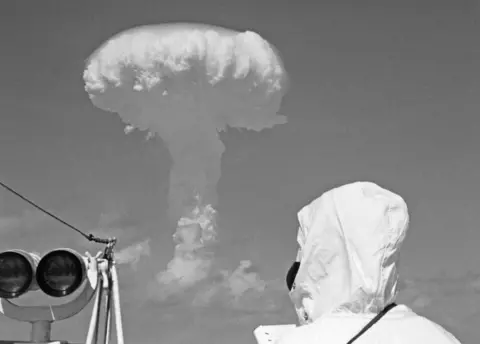The ramifications of nuclear testing extend beyond the physical realm—where the cataclysmic forces of atomic energy redefine terrestrial landscapes. They intrude into the moral fabric of society, challenging ethical boundaries and inciting fierce debate. An unsettling question lurks: did the British test their nuclear bomb on their own soldiers? This inquiry invites scrutiny into the historical context, the political climate, and the human consequences of nuclear experiments conducted during the mid-20th century.
The origins of British nuclear testing can be traced back to the post-World War II era, a time characterized by geopolitical tensions and a race for supremacy in military capability, particularly atomic weaponry. The UK embarked on its nuclear program amidst fears of the burgeoning Soviet threat. This quest led to the first British atomic bomb tests in Australia, specifically at the Montebello Islands and later at Maralinga and Emu Field in South Australia. The atmosphere is suffused with the ethos of defense, yet it is marred by disquieting undertones of experimentation.
At the heart of the inquiry lies a paradigm of military ethics that was often subservient to the exigencies of national security. The tests, conducted between 1952 and 1963, involved not only advanced scientific apparatus but also encompassed the placement of military personnel within close proximity to nuclear detonation sites. Documented accounts suggest that soldiers were positioned strategically to observe the effects of the blasts, ostensibly for the acquisition of data pertaining to wartime tactics and protective measures.
This precipitated what is widely perceived as a troubling intersection of duty and vulnerability. Soldiers were assured of safety protocols, yet the observable reality was often starkly different. Many veterans later reported experiencing severe health complications, reminiscent of the maladies associated with radiation exposure. The question of whether these individuals were treated as mere test subjects or as patriotic defenders of their nation gives rise to profound ethical dilemmas.
The repercussions of these tests were extensive, stirring legal, political, and personal ramifications that rippled through decades. The British government’s position, ostensibly framed as one of essential national defense, raises queries about informed consent. How genuine was the comprehension of risks among those conscripted for these operations? The concept of voluntarism in military service is predicated on nuanced understandings of the potential dangers, yet many recruits were motivated by a sense of obligation to their country, potentially clouding their ability to assess the gravity of their situation.
In the wake of these tests, a series of judicial and investigatory actions emerged as veterans sought recognition and recompense for their suffering. The long-standing silence of the government on the health issues linked to atomic exposure only amplified the discontent among veterans. Subsequently, in the early 2000s, increments of acknowledgment began to surface: medals were eventually awarded, and some veterans achieved compensation, attempting to rectify a historical oversight that many believed had rendered their sacrifices invisible.
The interplay between military necessity and ethical accountability poses a compelling discourse. On one hand, it echoes with the operational pragmatism that defined the Cold War landscape—a necessity born out of existential threats. Conversely, the blatant disregard for human health and dignity evokes a somber critique of governance that prioritizes strategic advantage over the welfare of individuals entrusted with its execution.
The fascination surrounding this moral quandary has engendered numerous scholarly analyses and retrospectives, each unraveling the complex layers beneath the surface of military advancement. The tragic irony is that in a clear bid to enhance national security, the very individuals charged with defending that security were subjected to undue risks—ultimately compromising their health and lives. The implications of such practices are profoundly unsettling, as they demand a reexamination of the ethical frameworks that govern military operations.
As the world grapples with the legacies of nuclear power, the British experience serves as a cautionary tale—a reminder of the intricate balance between protecting a nation and safeguarding its citizens. The concerns raised by the veterans resonate within contemporary discussions regarding military ethics, informed consent, and the responsibilities of governments toward their armed forces. This ongoing dialogue is essential to forging a path forward that ensures no soldier, regardless of the era, is sacrificed on the altar of national interests.
In conclusion, the inquiry into whether the British tested their nuclear bomb on their own soldiers invites a multifaceted exploration of historical, ethical, and human considerations. The recollections of veterans not only highlight the immediate dangers they faced but also serve as a compelling reminder of the sacrifices inherent in military service. As the world continues to confront the reality of nuclear weapons, the lessons learned from past experiences should guide future policies to ensure the protection of those who serve, thereby transforming tragedy into a vigilant commitment to ethical military practices.












